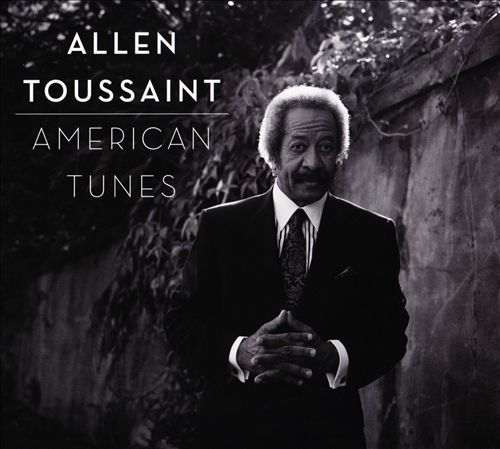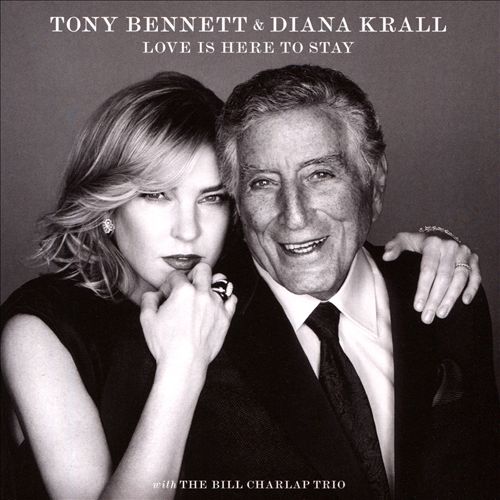Allen Toussaint
American Tunes

By John Fordham
Like the great New Orleans singer-songwriter Allen Toussaint’s 2009 album "The Bright Mississippi" (a tribute to classics by jazz giants from Bechet to Monk), this set, completed just before its creator’s death last November, is a gently personal slice of Americana. You can hear it in the steady ragtime bounce of Fats Waller’s Viper’s Drag, Professor Longhair’s Hey Little Girl, Bill Evans’ Waltz for Debby (played as a conga-coaxed Latin shuffle) and the Paul Simon anthem behind the album title, with its segues of American history and personal struggle, sung with an awed resolve by Toussaint himself. It’s mostly instrumental (Toussaint’s keyboard style has a trilling, Jelly Roll Morton-like daintiness and debonair swagger), though guests including saxophonist Charles Lloyd and guitarist Bill Frisell add contemporary ambiguities to Billy Strayhorn’s Lotus Blossom and Ellington’s Come Sunday. Toussaint’s intimacy with classic R&B, soul and funk inflects all his jazz playing, even if American Tunes is for the most part a low-key (and perhaps faintly wistful) look back at a wonderful musical life.
Tony Bennett & Diana Krall
Love Is Here To Stay By Bobby Reed
By Bobby ReedPart of the reason that Tony Bennett, 92, has remained artistically vital over the decades is his willingness to work with unexpected vocal partners, as evidenced by A Wonderful World (his 2002 collaboration with K.D. Lang), Cheek To Cheek (his 2014 release with Lady Gaga) and his series of Duetsalbums (which included contributions from Paul McCartney, Aretha Franklin, Amy Winehouse and Marc Anthony). On Bennett’s new album—devoted to the compositions of George and Ira Gershwin—his vocal partner is of the more expected variety, given her long history of interpreting the Great American Songbook: Diana Krall. Bennett and Krall have, in fact, recorded duets before, on his albums Playin’ With My Friends: Bennett Sings The Blues (2001) and Duets: An American Classic (2006). But Love Is Here To Staymarks their first album-length collaboration. One unusual twist here is that Krall doesn’t play piano on the session, instead focusing on vocal duets with the master, while the instrumentation is provided by pianist Bill Charlap’s impeccable trio. The result is a gem that showcases not only the longevity of the material, but of Bennett himself, who found fame after serving in the Army during World War II.
Bennett and Krall offer 10 delightful duets—including “I Got Rhythm,” “Do It Again” and “Nice Work If You Can Get It”—and each vocalist delivers one solo rendition; his is “Who Cares?” and hers is “But Not For Me.” Just as salt and pepper can work together in a recipe, Bennett’s authoritative vocals and Krall’s more delicate delivery complement each other, and several tunes conclude with a delicious bit of unison singing. On the album opener, “’S Wonderful,” there’s a brief segment in which Krall very quietly scats beneath Bennett’s lead vocal. That moment, along with Bennett’s chuckle at the end of “I’ve Got A Crush On You,” illustrates the singers’ chemistry and camaraderie. On “Somebody Loves Me,” there’s a slight reversal of typical roles, as Krall is more exuberant and Bennett is more subdued. These vocalists’ performances are a master class in the art of listening, reacting and then listening even more closely before responding. A swinging version of “My One And Only” features Charlap’s fluid pianism, drummer Kenny Washington’s compelling brushwork and a sturdy bass line from Peter Washington. It also features the type of clever lyrics that made Ira Gershwin such an important partner to George: “I tell you, I’m not asking any miracle/It can be done, it can be done/ I know a clergyman who will grow lyrical/ And make us one, and make us one.”
Hardcore Gershwin fans might want to seek out the Target Exclusive version of this album, which contains two additional solo tracks: Bennett’s reading of “Oh, Lady Be Good!” and Krall’s rendition of “How Long Has This Been Going On?”
Joe Locke & Geoffrey Keezer Group
Live In Seattle
By John KelmanVibraphonist Joe Locke and keyboardist Geoffrey Keezer have been working together for some time as the New Sound Quartet, which has released two discs in Japan. But while that group—clearly the precursor to this quartet—focused out of necessity on a primarily standards-based repertoire, Live in Seattle provides a far better and more accurate representation of its potential. Featuring three songs each by Locke and Keezer, it's also further evidence that Locke—along with Stefon Harris and Steve Nelson—is one of the most creative, open-minded and forward-thinking vibraphonists on the scene today.
The same can be said for the rest of the group, in particular Keezer, whose recent Wildcrafted: Live at the Dakota(MaxJazz, 2005) was a powerful document of his growing skills as improviser, composer and bandleader. His innate understanding of technology makes for a totally organic integration. And his writing—like Locke's—often places demands on both the players and listeners, but avoids complex constructs that exist merely for their own sake.
Bassist Mike Pope—heard recently on Bill Bruford's Earthworks Underground Orchestra (Summerfold, 2006)—provides an unshakable anchor. He's flexible enough to provide gentle support on Locke's evocative ballad "Miramar," and play more assertively on Keezer's funk/reggae-informed "Tulipa."
When speaking about the recent Montreal Jazz Festival's Suono Italia series, the increasingly ubiquitous Terreon Gully referred to it as "polite," and there's certainly nothing polite about his role here. During Keezer's solo on "Van Gogh by Numbers," the drummer proves himself more than just capable of responding to his surroundings, instead suggesting ideas rhythmically that elicit melodic responses. But as dominant as Gully is, he doesn't dominate. This is a quartet of collaboration, not of self-promotion.
Compare this version of "Van Gogh By Numbers" with the one on Van Gogh by Numbers (Wire Walker, 2006), Locke's mallet duo disc with marimba player Christos Rafalides. The title track was a detailed chamber piece—powerful in its own way, but also more delicate and ethereal. On Live in Seattle, with Pope and Gully, it becomes a fervent piece that approaches the energy of fusion, but without the excess.
There may be clearly delineated and impressive soloing throughout the hour-long set—Keezer and Locke deliver frenzied yet focused solos during the hard-swinging middle section of Locke's up-tempo closer "The King (For T.M.)"—but what's most striking is how the quartet seems to breathe as a single entity.
On the one cover—James Taylor's anti-war song "Native Son," where Gully's military-style drumming sets up the mood perfectly—the quartet manages to retain its emotional ambiguity and moral simplicity while turning the piece into a vehicle for one of Locke's most lyrical solos of the set.
Arranging to record a concert always creates the hope for one of those special performances where everything gels perfectly. Live in Seattle captures the Locke/Keezer Group on one such occasion, finally realizing the fully contemporary potential of this ongoing collaboration.
Track Listing:
Van Gogh By Numbers; Honu; Fractured; Native Son; Miramar; Tulipa; The King (For T.M.).
Personnel:
Joe Locke: vibes; Geoffrey Keezer: piano, keyboards; Mike Pope: acoustic and electric bass; Terreon Gully: drums.
Seth MacFarlane
Music Is Better Than Words By Stephen Thomas Erlewine
By Stephen Thomas Erlewine A vanity project that evades any rational explanation, as its flights of fancy are so far removed from its creator’s home turf, Music Is Better Than Words is a traditional big-band album from Seth MacFarlane, the self-satisfied wise-ass behind Family Guy. Demonstrating precisely the same amount of imagination that led him to creating no less than three permutations of Wait Till Your Father Gets Home, MacFarlane plays it straight throughout Music Is Better Than Words, hiring American Dad composer Joel McNeely to create approximations of Nelson Riddle, Gordon Jenkins, and Billy May's arrangements for Frank Sinatra's deathless, mid-century records for Capitol. These classic concept albums are clearly the blueprint for Music Is Better Than Words, which was, after all, recorded at Capitol Records' legendary studio with MacFarlane singing into the very same microphone Sinatra used all those years ago, and there is a bit of a concept to this 2011 LP, too, with the cartoonist selecting songs never recorded by any member of the Rat Pack -- along with a couple recent tunes like “She’s Wonderful Too,” which McNeely originally wrote for The Young Indiana Jones Chronicles -- for his tribute to that ring-a-ding-ding swing. MacFarlane and McNeely don’t attempt to ape the pizzazz of Frank’s Reprise years, nor do they spend much time with May’s snazzy snap, they stick with Riddle and Jenkins, keeping things sentimental and lush even when the words crackle with wit. Then again, MacFarlane is so concerned about inhabiting Sinatra’s silken suits he doesn’t really care about the meaning of the songs; all that matters is sounding like Ol' Blue Eyes, which MacFarlane does about as well as any number of hotel lounge singers this world over. Sure, it’s a surprise that he can carry a tune, but it’s no surprise that MacFarlane, who came to fame and fortune by telling obvious jokes so slowly a dog could understand, considers his competence as proof of his excellence, his smugness bearing no swagger, his self-satisfaction undercutting his otherwise perfectly pleasant surroundings.




